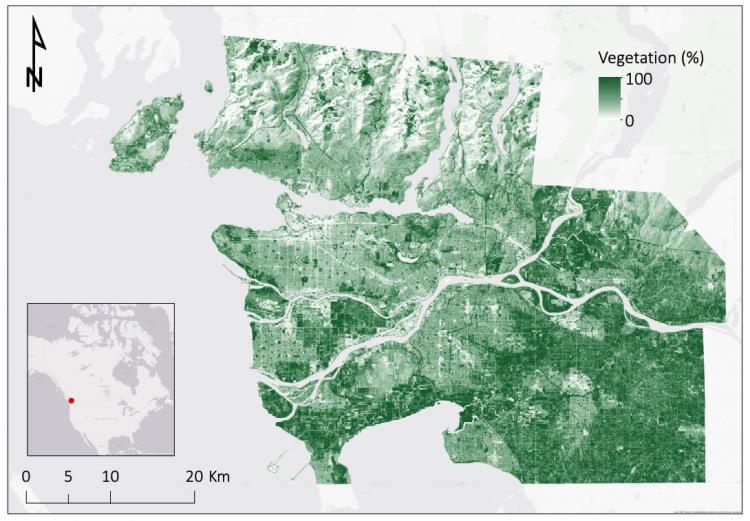Want to ensure your child hits their expected developmental milestones? New UBC research suggests living in areas with high exposure to greenspace can help set them up for success.

Map depicting the annual percentage of greenspace in Metro Vancouver for 2011. Darker shades of green depict areas of higher vegetation percentage, while lighter shades of green depict areas of lower vegetation percentage.
For the study, researchers at the UBC faculty of forestry and faculty of medicine analyzed the developmental scores of 27,372 children in Metro Vancouver who attended kindergarten between 2005 and 2011. They estimated the amount of greenspace around each child's residence from birth to age five. They also assessed levels of traffic-related air pollution and community noise.
The results highlight the fundamental importance of natural green spaces like street trees, parks and community gardens, authors say.
"Most of the children were doing well in their development, in terms of language skills, cognitive capacity, socialization and other outcomes," says study author Ingrid Jarvis (she/her), a PhD candidate in the department of forest and conservation sciences at UBC. "But what's interesting is that those children living in a residential location with more vegetation and richer natural environments showed better overall development than their peers with less greenspace."
According to the researchers, the reason for this is partly greenspaces' ability to reduce the harmful effects of air pollution and noise environmental challenges that have been shown to adversely affect children's health and development through increased stress, sleep disturbances and central nervous system damage.
"Few studies have investigated this pathway linking greenspace and developmental outcomes among children, and we believe this is the first Canadian study to do so," adds Jarvis.
The researchers assessed early childhood development using the Early Development Instrument (EDI), a survey completed by kindergarten teachers for each child. The tool measures a child's ability to meet age-appropriate developmental expectations.
"More research is needed, but our findings suggest that urban planning efforts to increase greenspace in residential neighbourhoods and around schools are beneficial for early childhood development, with potential health benefits throughout life," says the study's senior author and UBC research associate, Matilda van den Bosch (she/her).
"Time in nature can benefit everyone, but if we want our children to have a good head start, it's important to provide an enriching environment through nature contact. Access to greenspace from a very young age can help ensure good social, emotional and mental development among children."
The study, published recently in The Lancet Planetary Health, includes contributions by researchers at the University of California Berkeley, University of California Los Angeles, Barcelona Institute for Global Health, BC Children's Hospital and BC Centre for Disease Control.
Disclaimer: This work was supported by data made accessible via Population Data BC, the Canadian Urban Environmental Health Research Consortium, and the Integrated Remote Sensing Studio at the University of British Columbia. All inferences, opinions, and conclusions drawn in this study are those of the authors, and do not reflect the opinions or policies of the Data Steward(s).












